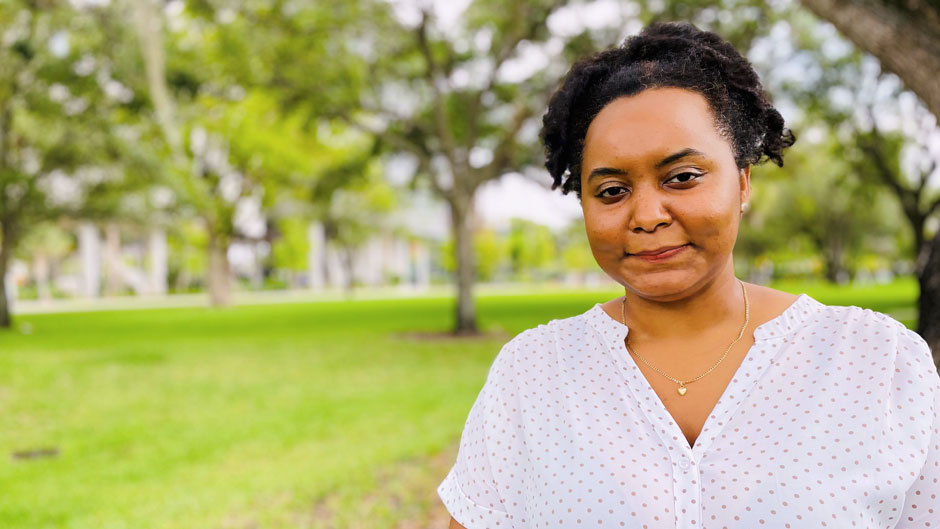University of Miami graduate student Paula Christina Viala was born and raised in Haiti. She came to the United States as a teenager, and affectionally calls her country “my heart.”
Now that she is studying for a Master of Professional Science in Urban Sustainability and Resilience, she often thinks of her troubled homeland and wishes that it were “greener and more sustainable and inclusive.”
Viala states that everyone should have a safe home, a livable environment, and safety from the ravages of climate change no matter their circumstances. She worries about the lack of affordable housing in Miami and the people who find themselves living in affordable housing that is not up to code, as well as those who are vulnerable to the effects of climate change.
“I have always been interested in issues of sustainability and social justice,” she said. However, her career path has experienced a few twists and turns. Since she was good in mathematics and science, Viala pursued a degree in civil engineering at Florida Atlantic University. Soon after graduation, she realized that her passion existed elsewhere.
“I decided to reroute my career,” she said, talking about her venture into the innovative and interdisciplinary Master of Professional Science in Urban Sustainability and Resilience, a newly established program that draws students from different disciplines and offers the two track options. Viala selected the program’s resilience track.
In the program, she met Sonia Chao, research associate professor of the School of Architecture and director of the Center for Urban and Community Design, who took a special interest in her.
Viala has had several classes taught by Chao and has served as her research assistant. And Viala is Chao’s teaching assistant this term.
“Paula embodies many of the qualities one hopes to find in a student,” Chao said. “She is intelligent, curious, and committed. Paula is passionate about working with communities to improve the quality of life of residents and business, be it through resilient design solutions, policy-making, or community engagement.”
Recently, Viala was able to partake in all the aforementioned activities during a spring course that focused on envisioning a more resilient Nantucket, Massachusetts. Viala illustrated her commitment to her education, classmates, and to making a difference in how her team delivered its concepts by going beyond the course requirements to create an additional user-friendly pamphlet with residents in mind. The students’ presentation on the island this past June was stellar, according to Chao.
“We hope our interdisciplinary MPS program increasingly will prepare future climate leaders for the growing tasks at hand,” said Chao. “Paula is well on her way to becoming one.”
The MPS program affords students three capstone alternatives, including internships. Viala’s hard work earned her a summer practicum internship at the Miami-Dade County Office of Resilience, where she is learning the many challenges a large county faces as the effects of climate change increase.
Susannah Troner supervises Viala as senior resilience and sustainability coordinator at the Office of Resilience.
“Ms. Viala is a bright and inquisitive graduate student and intern with a very good background that allows her to understand the complexity of climate change challenges and opportunities,” Troner shared. “I appreciate the questions she asks and her nongovernmental perspective. The University of Miami has been a partner with the county's Office of Resilience on many valuable projects. The UM Master's Degree program in Urban Sustainability and Resilience is yet another way we are strengthening this collaboration."
Viala’s latest project at the internship involves gathering information to create an inventory of the county’s light fleet parking locations in order to begin planning for electric vehicle charging infrastructure installations. She also is taking an inventory of all the county’s facilities. So, an assessment can be made of what it would take to sustain a fleet of electric cars, trucks, and vans.
“The county wishes to electrify their fleet of vehicles,” Viala said. “Cars generate CO₂emissions resulting in warmer local temperatures and this heat continues up into the atmosphere. Cars add to the overall temperature of the county during the day,” she added. “The more electric vehicles on the road, the more you reduce heat in the community. In addition, it is really important for the county to lead by example.”

